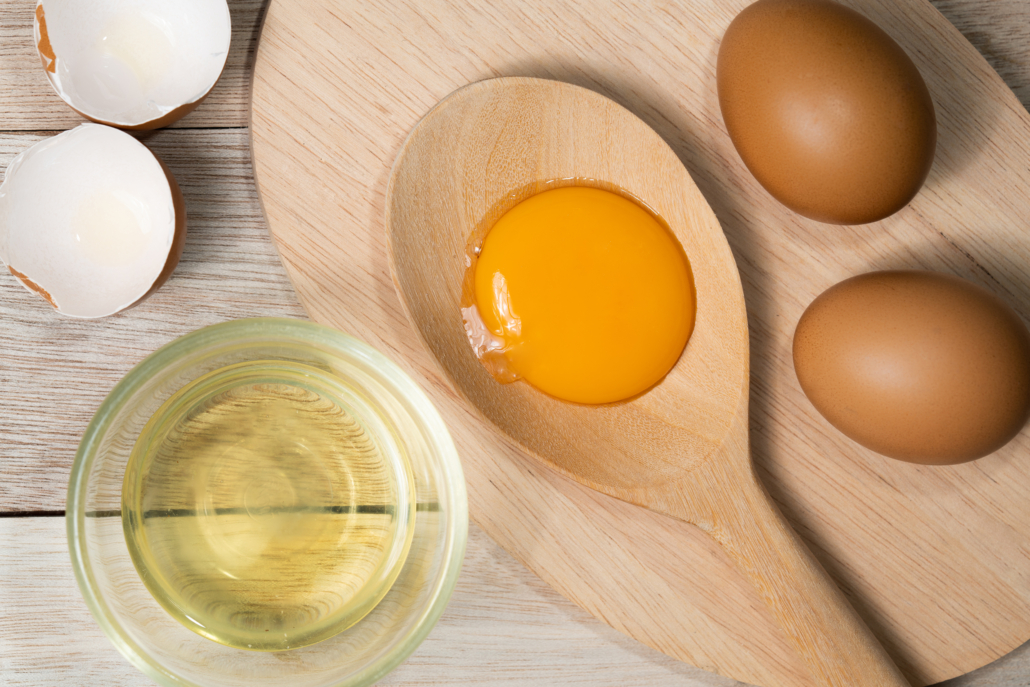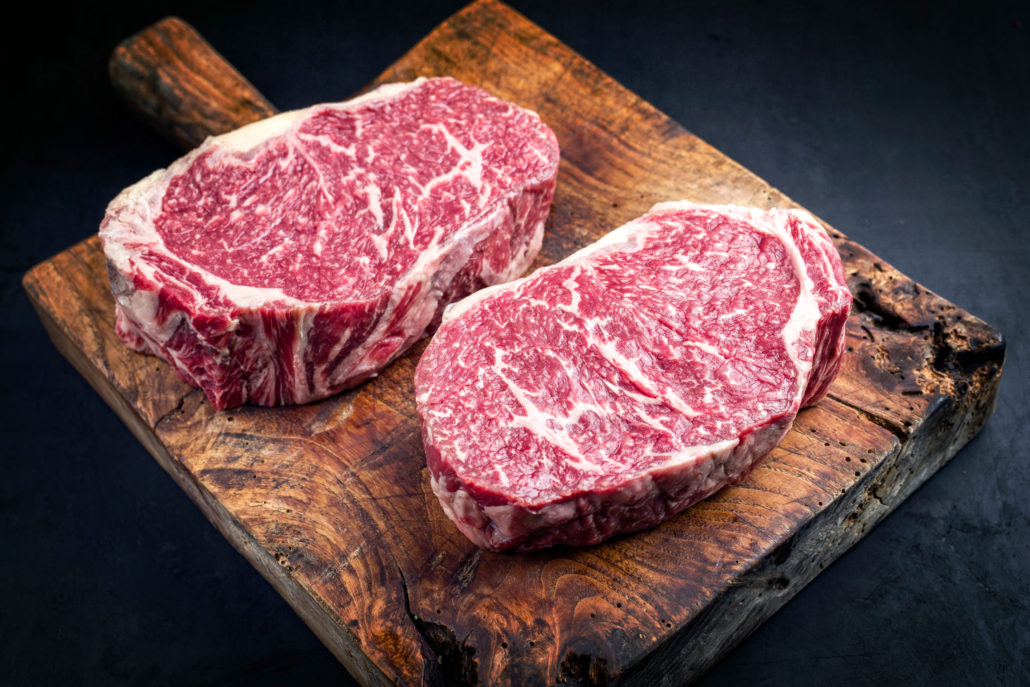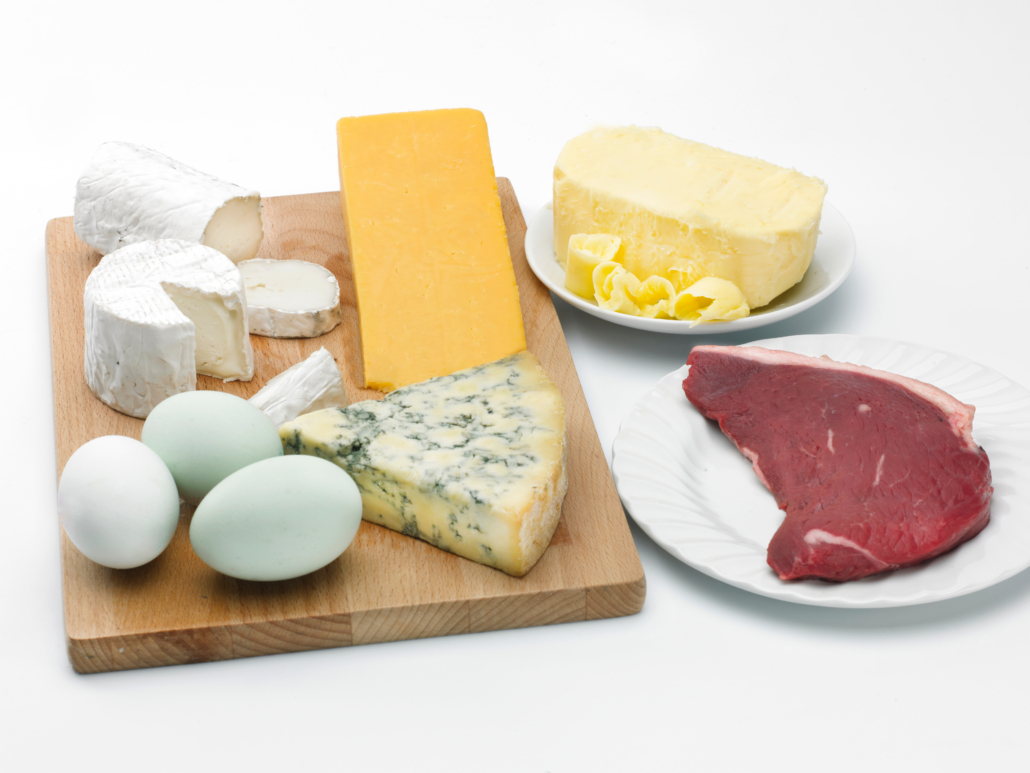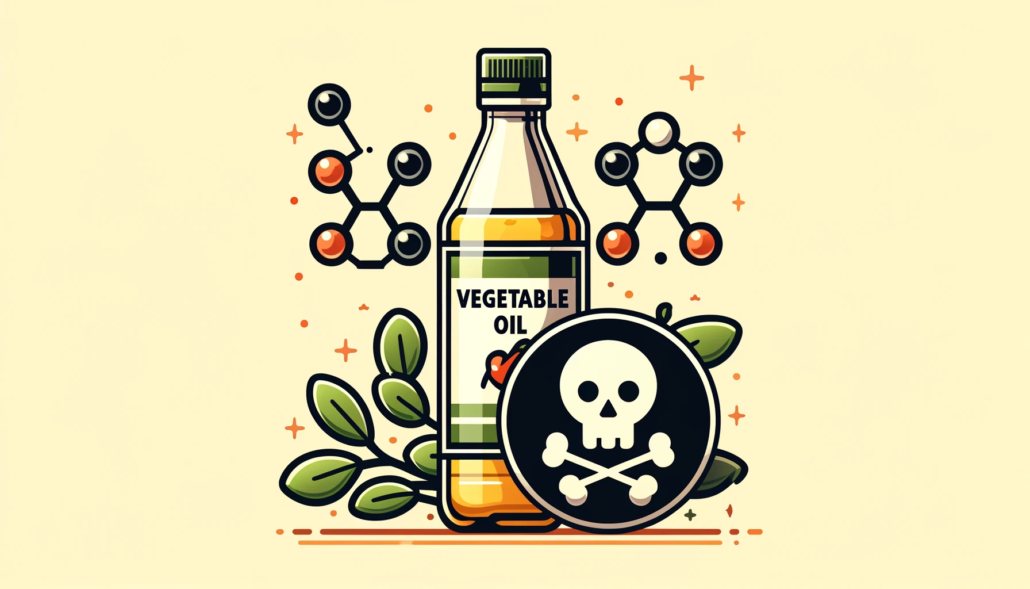We include products in articles we think are useful for our readers. If you buy products or services through links on our website, we may earn a small commission.
Is Cottage Cheese Keto? Carbs, Benefits, and Keto-Friendly Recipes
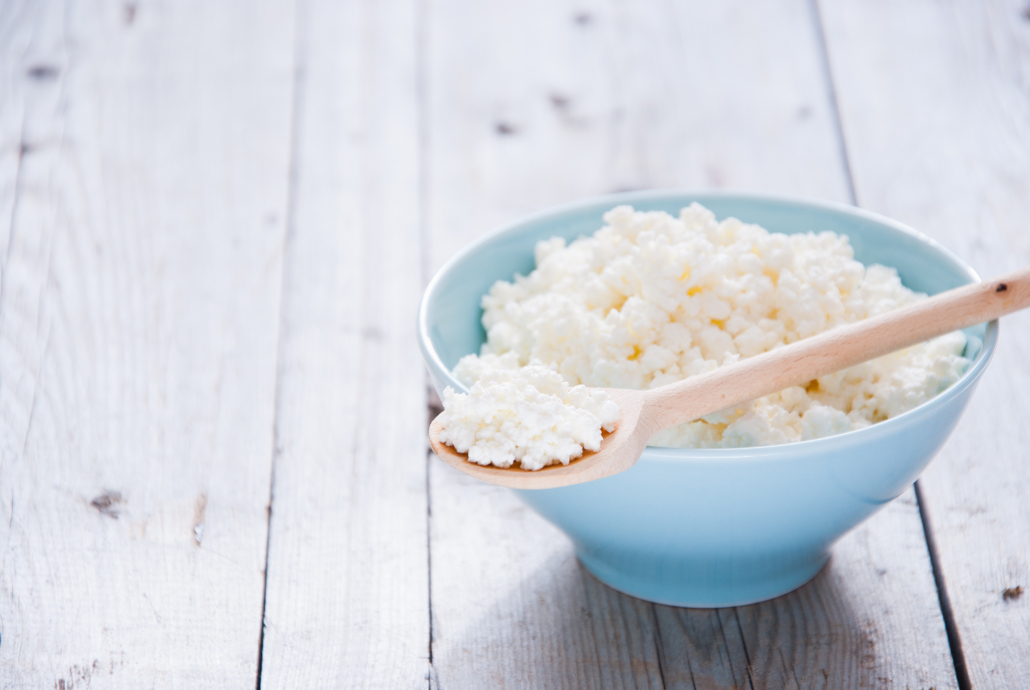
Cheese can be a key part of your well-formulated keto diet. And cottage cheese is one of the most delicious and versatile cheeses out there. But there are also carbs in cottage cheese. So is cottage cheese keto-friendly?
The short answer is, it depends.
Not all cheeses are created equal. Some cheeses like cream cheese have extremely high fat content with no carbs and little protein. Cottage cheese on the other hand, is relatively lean, offers some carbs, and is high in protein.
Keeping track of these macronutrient ratios is important when you’re trying to kick your body into ketosis–the metabolic state where you switch from relying on carbohydrates, to using fat for fuel.
Research suggests that a keto diet can offer numerous benefits including weight loss, healthy cholesterol levels, reduced insulin resistance and blood sugar levels, and protection against neurodegenerative diseases like Alzheimer’s and Parkinson’s. 1
In this article, we’ll explore the benefits of cottage cheese on keto, some pitfalls to watch out for, and a few delicious cottage cheese keto recipes.
Table of Contents
What is Cottage Cheese?
You remember it from when you were a kid–those fluffy white curds and that mild creamy, dare we say, refreshing, flavor. But what is cottage cheese anyway?
Simply put, it’s a fresh cheese made by adding acid to milk, then draining off some of the acid to give it a more mild flavor. Then cream and salt are usually added back in to give it it’s delectable taste and consistency.
Its origins go back at least 5,000 years. Cottage cheese even makes a cameo in Homer’s Odyssey. But its place within a keto diet is only recently being explored.
Cottage Cheese and Keto
Over the past two million years of evolution, the human body has developed an ability to quickly enter ketosis. For our cavemen ancestors, cycling in and out of ketosis while enjoying a diet of mostly animal meat supplemented with seasonal fruit was the norm.
But for us modern humans, consuming a Standard American Diet packed with processed grains and added sugar, entering ketosis means dramatically cutting carbs.
The standard keto macronutrient ratio for beginners is:
- 80% calories from fat
- 15% calories from protein
- 5% calories from fat
For most people, this means eating around 25 grams of carbs or less per day.
If you’re aiming to consume 2,000 calories per day, a standard keto macronutrient breakdown looks like:
- 178 grams of fat
- 75 grams of protein,
- 25 grams of carbs
However, once your body is keto-adapted, i.e. you’ve been in sustained ketosis for a few weeks to a few months, it is possible to moderately increase carbs and still produce ketones.
A 2004 study of 50 women on a keto diet found that after two weeks most subjects were able to increase their carb consumption from the initial 20 grams to between 40-60 grams per day while remaining in ketosis.2
Your upper carb limit will be based on your body weight, activity level, and individual metabolism. It will take some practice and experimentation to find it.
Cottage Cheese Carbs
1 cup of full-fat cottage cheese contributes 6.8 grams of net carbs to your diet, along with a whopping 24.6 grams of protein.
Though harder to find, some cottage cheesemakers are beginning to offer 8% milk fat “keto” cottage cheese. Offering similar amounts of protein and net carbs, keto cottage cheese provides twice as much fat.
It’s important to remember that keto is a moderate-protein diet. The reason for this is that your body will convert excess protein into carbohydrates in a process called gluconeogenesis.
This is also why carbs are not an essential part of the human diet–meaning your body will produce the carbs it needs so you don’t need to get them from your diet. 2
But when it comes to cottage cheese, net carbs and protein content means you have to pay attention and limit your consumption.
Below you’ll find the cottage cheese net carbs in different varieties per 1 cup:
| Type of cottage cheese | Calories | Carbs | Fat | Protein |
| 8% Milk Fat Keto Cottage Cheese | 300 | 6 grams | 18 grams | 28 grams |
| 4% Full fat | 281.2 | 6.8 grams | 9 grams | 25.6 grams |
| 2% Reduced fat | 162 | 10 grams | 4 grams | 20 grams |
| 1% Reduced fat | 144 | 6 grams | 2 gram | 24 grams |
| Nonfat | 144 | 14 grams | 0 grams | 20 grams |
| Low fat with pineapple and cherry | 195 | 26 grams | 2 gram | 18 grams |
| Low fat with garden vegetable | 196 | 8 grams | 8 grams | 22 grams |
As you can see from the above list, reduced-fat cottage cheese has less fat and more net carbs than full-fat cottage cheese.
In varieties with added fruit, the increased net carb content is obvious. But less obvious are the extra carbs you get from gum-based thickeners used in low-fat dairy to replace the texture that’s lost when the fat is removed.
Cottage Cheese Nutrition
In addition to fat, carbs, and protein, cottage cheese offers decent amounts of various beneficial micronutrients including B vitamins, selenium, and calcium.
Per 1 cup full-fat cottage cheese
| Nutrient | Amount | %RDV |
| Calories | 281.2 | |
| Fat | 9g | N/A on keto |
| Carbohydrates | 6.8g | N/A on keto |
| Protein | 24.6g | N/A on keto |
| Sodium | 819mg | 54% |
| Calcium | 188mg | 13.5% |
| Potassium | 234mg | 4.6% |
| Phosphorus | 357.9mg | 33.9% |
| Zinc | 1.0mg | 6.8% |
| Selenium | 21iµg | 40% |
| Choline | 42mg | 6.8% |
| Vitamin B6 | 0.01mg | 9% |
| Vitamin A | 315IU | 11% |
| Vitamin B5 | 1.4mg | 24% |
| Vitamin B2 | .4mg | 30% |
| Vitamin B12 | 1.0µg | 40% |
Sodium on Keto
You may have noticed that cottage cheese provides a lot of sodium: 54% of your sodium intake per 1 cup.
It’s worth noting that on a keto diet, especially when starting out, increasing your salt content is a crucial step to reducing the various keto side effects that taken together comprise the so-called “keto flu.”
When you transition to keto your body dumps water along with electrolytes. To rebalance your electrolytes it’s recommended that you consume 12 grams (2 tsps) of salt per day in the first few days of adapting to keto. Once you’re adapted, at least 5 grams (1tsp) of salt daily will help you avoid headaches, fatigue, and constipation.
So even though there are sodium-free cottage cheese options, it’s best to choose normal, full-fat cottage cheese when on keto.
Is Cottage Cheese Keto Friendly?
When considering the nutrient profiles detailed above, the provisional answer is, yes! Cottage cheese can be a great keto diet food,
Cottage cheese provides healthy fats, protein, while being relatively low in carbs. All keys to starting and maintaining a well-formulated keto diet.
But make sure to choose full-fat (or 8% fat) varieties, and avoid types that have added fruit.
Cottage cheese’s salt content along with its vitamins and minerals can replenish some of the nutrients that are flushed when making the transition to keto, helping you avoid keto flu.
Ways to Make Cottage Cheese Keto-Friendlier
To reduce concerns about consuming too much protein and not enough fat, you can make cottage cheese a bonafide keto superfood by doing two things:
- Add heavy cream or creme fraiche for “sweeter” applications
- Add olive oil, sour cream, and chopped olives for more savory applications
Benefits of Cottage Cheese
The benefits of cottage cheese on keto can be attributed to 2 main factors:
- Healthy fats and protein for satiety and weight loss
- Probiotics for gut health
Healthy Fats and Protein, Low Calories
As we looked at above, fat is the key nutrient when you’re practicing a keto diet. Full-fat, and 8% milkfat cottage cheese provide decent amounts of fat at 9 grams, and 18grams, respectively.
But cottage cheese really shines when considering how the combination of fat and protein dramatically increases feelings of fullness and satiety, while still being a low-calorie food.3 4
Studies show that cottage cheese matches eggs in its ability to stimulate feelings of fullness and suppress the hunger hormone ghrelin. For this reason, cottage cheese is included in numerous weight loss regimens.5 6
The satiating power of cottage cheese also makes it a fantastic addition to intermittent fasting plans, and when combining intermittent fasting and keto.
Probiotics For Gut Health
Cottage cheese can be a fantastic source of probiotics. But check the package labels for live and active cultures.
These probiotics will support a healthy microbiome which plays a crucial role in every physiological function including 7 8 9 10:
- The production of neurotransmitters that regulate mood
- Balancing hormones that promote reproductive health and robust metabolism
- Immune responses that regulate inflammatory and antiviral activities
A 2020 study published in Cell, found that ketogenic diets have a dramatic impact on your gut microbiota. It showed that these changes led to reduced inflammation. The study authors suggest that a ketogenic diet could be used as a therapy for autoimmune disorders of the gut. [50]
Other studies looking at the benefits of ketogenic diets on multiple sclerosis and epilepsy found that eating keto resulted in beneficial changes in the microbiome. [51] [52]
Making probiotic cottage cheese part of your keto diet food list can benefit the short term power of keto to reset your microbiome. And it can help populate your microbiome with beneficial organisms that will keep you healthy in the long run.
Cottage Cheese Keto Recipes
These quick and easy keto cottage cheese recipes will help you enjoy the benefits of cottage cheese while boosting the variety of your keto diet, especially for people practicing more restrictive approaches like the vegetarian keto diet.
Keto Cottage Cheese Pancakes
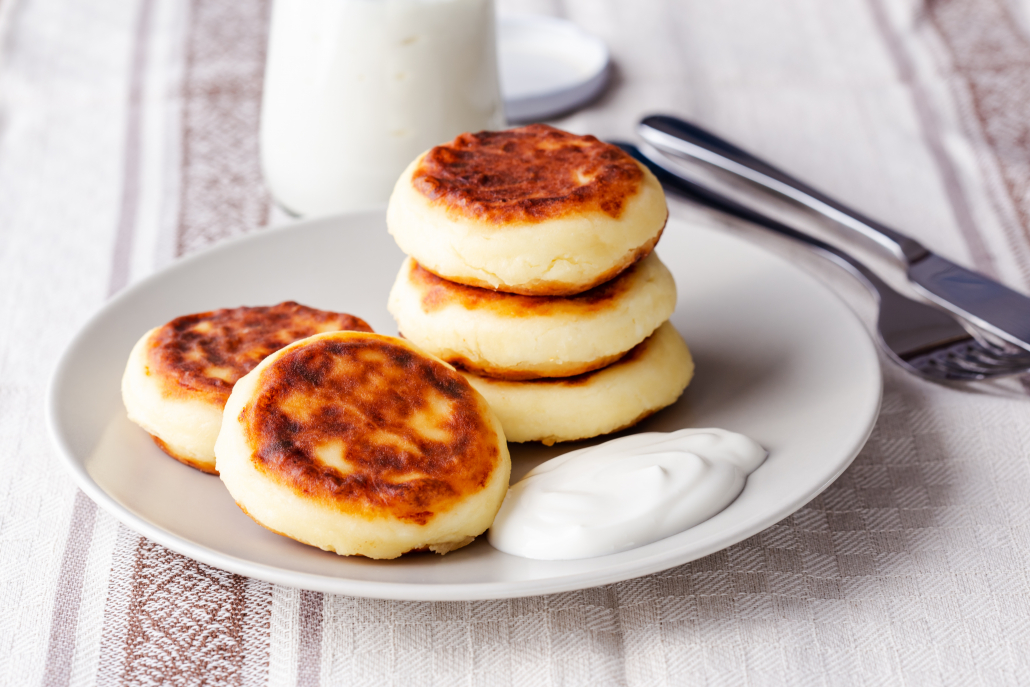
These cottage cheese pancakes are delicate, fluffy, and easy! On keto it’s often the bready-bits that people miss the most. Here’s a great way to enjoy a keto-friendly version of this weekend staple.
Ingredients
4 large eggs
1 cup whole milk cottage cheese
1 tablespoon pure vanilla extract
½ teaspoon stevia glycerite (optional; equals about 2 tablespoons sugar)
6 tablespoons coconut flour (42 grams)
½ teaspoon baking soda
Ghee or butter
Instructions
- In a large bowl whisk together eggs, cottage cheese, and vanilla.
- Whisk in coconut and baking powder for a thick batter
- Heat a large skillet over over medium flame
- Add in 1 teaspoon ghee or butter
- Transfer 2 tablespoon dollops of batter into the skillet. Gently use a spatula to flatten the tops of mounds.
- Cook each pancake until bottoms are golden brown, about 3-4 minutes.
- Take care when flipping pancakes–they’re more delicate than non-keto pancakes. Cook for another 2-3 minutes
- Top with butter, sour cream, creme fraiche, or a small amount of low-carb berries
Enjoy!
Keto Cottage Cheese Baked Omelette
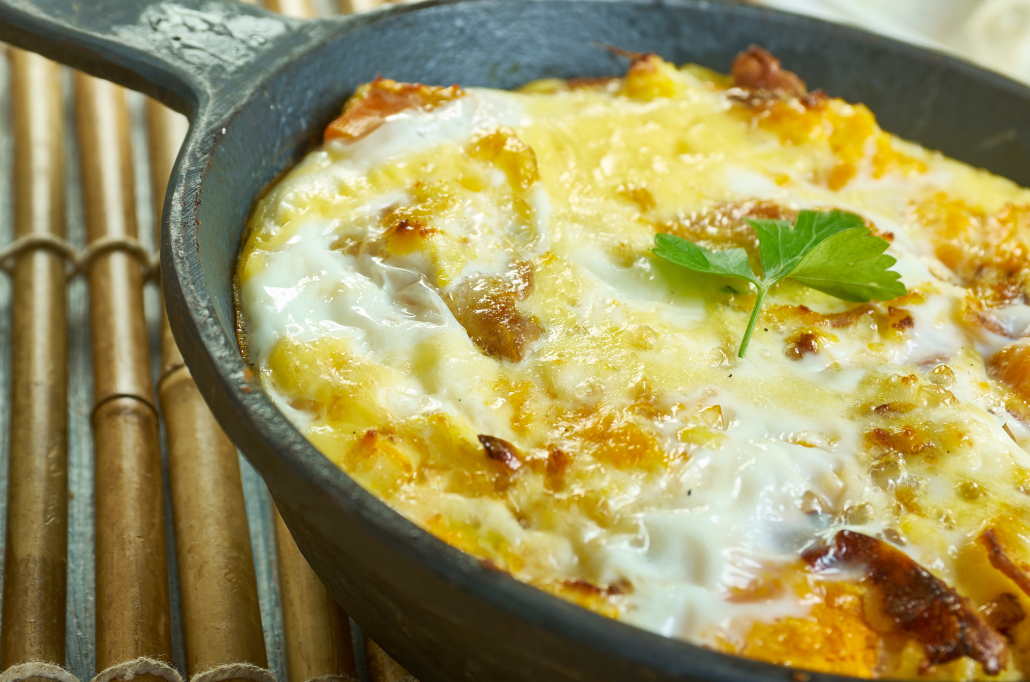
Though omelets are often thought of as breakfast food, keto recipes have a way of making all meals savory and satiating enough to enjoy any time of the day. This baked cottage cheese omelette is an entire meal in one recipe. With its inclusion of some fresh herbs and low-carb veggies, it fits especially well in a mediterranean keto diet.
Ingredients
- 4 slices of thick-cut uncured bacon or ¼ lb fresh pork belly
- 1 tablespoon butter or ghee
- ¼ cup chopped onion
- 1 cup diced zucchinis
- 6 large eggs–pasture-raised if possible
- 1 cup full-fat (4%) or keto (8%) cottage cheese
- ¾ teaspoon salt
- ½ teaspoon pepper
- 1/2 cup cherry tomatoes, halved
- 1 avocado, halved
- ¼ cup cilantro, finely chopped
Directions
- Preheat oven to 350 °F
- In a 9-inch cast-iron skillet, over medium heat, cook bacon or pork belly until crisp. Transfer to a plate. Drain some of grease from pan
- Add butter or ghee, cook onions and thin sliced zucchini until onions begin to brown and and zucchini gets tender: about 5 minutes
- In a large bowl, mix eggs, ½ cup of cottage cheese, salt, and pepper.
- Stir in bacon.
- Pour into skillet over onions and zucchinis
- Put skillet in oven. Bake for 10-15 minutes, or until the center of omelet is set
- Top with dollops of cottage cheese, tomatoes, avocado, scallions, and cilantro for garnish.
Serve warm and enjoy!
Is Cottage Cheese Keto? The Takeaway
Full-fat cottage cheese does have a well-founded place in a keto diet.
Its combination of fat and protein while being low-calorie make it great for people who are choosing keto to control food cravings and lose weight. And it’s probiotics further support the ability of a ketogenic diet to reset your gut microbiome.
But keep in mind that cottage cheese is mostly protein, and it does contain some carbs. Since a ketogenic diet is a high-fat, moderate-protein, and low-carb way of eating, it’s best to incorporate cottage cheese into higher-fat keto recipes. Otherwise you’ll need to balance it out with other keto fats throughout the day.












